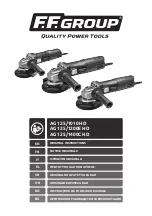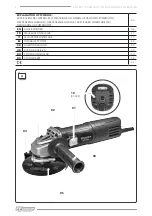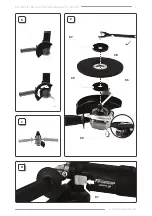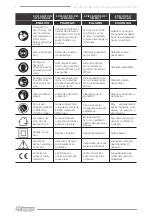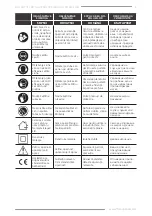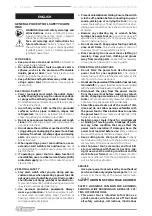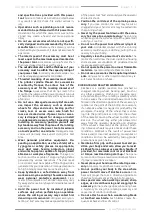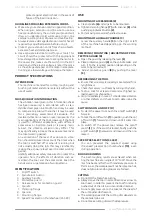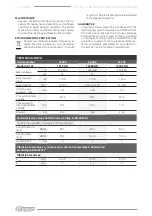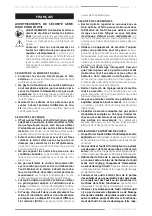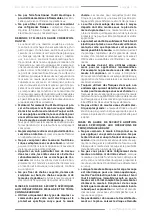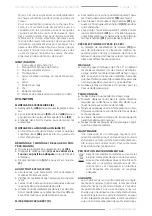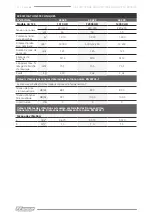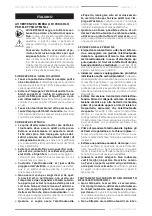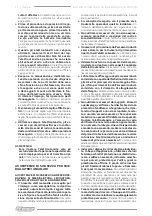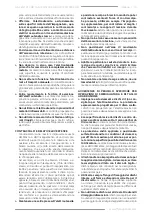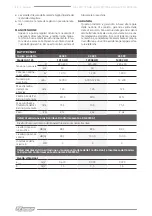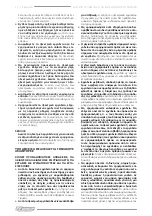
protect against electric shock in the event of
failure of the basic insulation.
GUIDELINES FOR USING EXTENSION CORDS
f
Make sure your extension cord is in good condition.
When using an extension cord, be sure to use one
heavy enough to carry the current your product will
draw. An undersized cord will cause a drop in line
voltage resulting in loss of power and overheating.
f
Always replace a damaged extension cord or have it
repaired by a qualified person before using it.
f
Protect your extension cords from sharp objects,
excessive heat and damp/wet areas.
f
Use a separate electrical circuit for your tools. This
circuit should be protected with the appropriate
time-delayed fuse. Before connecting the motor to
the power line, make sure the switch is in the OFF
position and the electric voltage is rated the same
as the voltage stamped on the motor nameplate.
Running at a lower voltage will damage the motor.
PRODUCT SPECIFICATIONS
INTENDED USE
The machine is intended for cutting, roughing and
brushing of metal and stone materials without the
use of water.
NOISE/VIBRATION INFORmATION
The vibration level given in this information sheet
has been measured in accordance with a stan-
dardized test given in EN 60745 and may be used
to compare one tool with another. It may be used
for a preliminary assessment of exposure. The
declared vibration emission level represents the
main applications of the tool. however if the tool
is used for different applications, with different
accessories or insertion tools or is poorly main-
tained, the vibration emission may differ. This
may significantly increase the exposure level over
the total working period.
An estimation of the level of exposure to vibra-
tion should also take into account the times when
the tool is switched off or when it is running but
not actually doing the job. This may significantly
reduce the exposure level over the total working
period.
Identify additional safety measures to protect the
operator from the effects of vibration such as:
maintain the tool and the accessories, keep the
hands warm, organization of work patterns.
IDENTIFICATION
1.
On/Off switch
2. Spindle lock button
3. Auxiliary handle
4. Protective guard
5.
Release lever for protection guard
6. Spindle
7.
Clamping flange
8. Spanner
9.
Mounting flange
10. Speed Preselection thumbwheel (45 589)
USE
mOUNTING OF ACCESSORIES (E)
f
Clean spindle
(6)
and all parts to be mounted.
f
Tighten clamping flange
(7)
with spanner
(8)
while
pushing spindle-lock button
(2)
.
f
For removing accessories handle vice-versa.
mOUNTING OF AUxILIARy HANDLE (C)
Screw the auxiliary handle
(3)
on the right or left
of the machine head depending on the working
method.
REmOVING / mOUNTING / ADjUSTING OF pRO-
TECTIVE GUARD (B)
f
Open the guard by releasing the lever
(5)
f
Place protective guard
(4)
on the spindle collar
and
turn it to the required position (depending on the
work to be carried out).
f
Adjust protective guard
(4)
by pushing the lever
(5)
.
BEFORE USING THE TOOL
f
Ensure that accessory is correctly mounted and firm
-
ly tightened.
f
Check if accessory runs freely by turning it by hand.
f
Test-run tool for at least 60 seconds at highest no-
load speed in a safe position.
f
Stop immediately in case of considerable vibration
or other defects and check tool to determine the
cause.
SWITCHING ON AND OFF (D)
f
To start the power tool, push the on/off switch
(1)
forward.
f
To lock the on/off switch
(1)
in position, push the on/
off switch
(1)
forward and down until it clicks into
place.
f
To switch off the power tool, release the on/off
switch
(1)
; or, if the switch is locked, briefly push the
on/off switch
(1)
backward and down and then re-
lease it.
SpEED pRESELECTION (45 589)
You can preselect the required speed using
the speed preselection thumbwheel
(10)
, even
during operation.
ROUGH GRINDING
The best roughing results are achieved when set-
ting the machine at an angle of 30° to 40°. Move the
machine back and forth with moderate pressure. In
this manner, the workpiece will not become too hot,
does not discolor and no grooves are formed.
CUTTING
f
Do not tilt the tool while cutting.
f
Always move the tool in same direction as arrow on
tool head, in order to prevent the tool from being
pushed out of the cut in an uncontrolled manner.
f
Do not apply pressure on the tool; let the speed of
the cutting disc do the work.
f
The working speed of the cutting disc depends on
the material to be cut.
f
Do not brake cutting discs with side pressure.
English |
9
www.ffgroup-tools.com
AG 125/1010 HD | AG 125/1200E HD | AG 125/1400C HD

